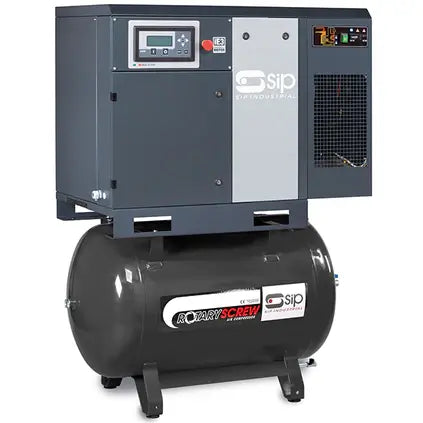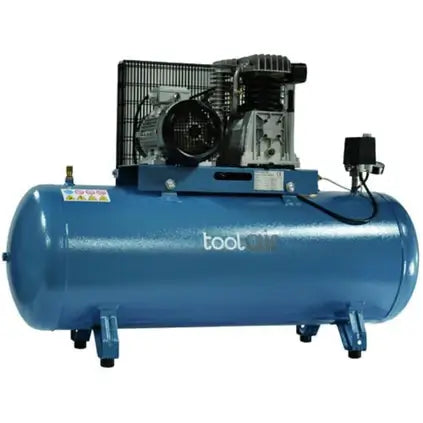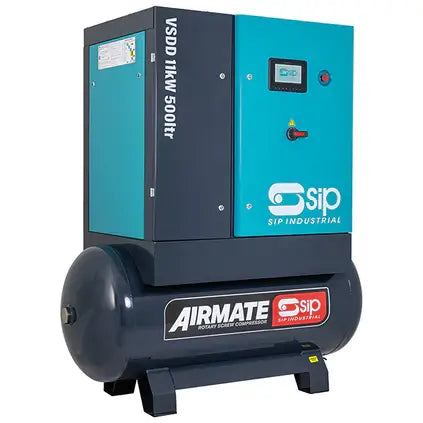
Can Air Compressors Run Out of Air? Find Out!
Air compressors are essential tools in various industries, providing a steady source of compressed air for powering tools and equipment. If you rely on an air compressor for your work, you may wonder if it can ever run out of air. In this article, we will explore this question and discuss the importance of air compressor maintenance to ensure optimal performance.
Regular maintenance plays a vital role in keeping air compressors running smoothly. By performing routine checks and following maintenance guidelines, you can prevent potential issues that may lead to air compressor failure. Let's delve into the topic of air compressor maintenance and discover how it can help you maximize the efficiency and lifespan of your equipment.

Key Takeaways:
- Proper air compressor maintenance is crucial to sustain its performance.
- Regularly checking air compressor levels, such as oil, coolant, and air pressure, is essential.
- Preventive maintenance can help avoid potential air compressor failures.
- Troubleshooting common issues promptly can minimize downtime and ensure continued productivity.
- By following maintenance guidelines, you can extend the life of your air compressor and avoid running out of air.
Preventing Air Compressor Failure with Proper Maintenance
Maintaining your air compressor is crucial to prevent any potential failures and ensure its efficient performance. Regularly checking air compressor levels, such as the oil, coolant, and air pressure, is essential to keep it running smoothly. By following these maintenance tasks, you can avoid costly breakdowns and maximize the lifespan of your air compressor.
Checking Air Compressor Levels
To maintain the optimal function of your air compressor, it is important to regularly check its various levels. Here are the key levels that require monitoring:
- Oil Level: Insufficient oil can lead to increased friction and eventual damage to the compressor. Check the oil level regularly and top up if necessary.
- Coolant Level: The coolant helps regulate the temperature of the compressor, preventing overheating. Ensure that the coolant level is within the recommended range.
- Air Pressure: Check the air pressure gauge to ensure that it falls within the specified operating range. Adjust if needed to maintain optimal performance.
Regular Maintenance Tasks
In addition to checking the levels, there are other maintenance tasks that should be performed regularly:
- Cleaning: Keep the air compressor clean and free from dirt and debris. Regularly remove any accumulation that may obstruct airflow or damage internal components.
- Filter Replacement: Air filters play a vital role in keeping the air compressor's intake clean. Replace filters as recommended to ensure efficient operation.
- Belt Tension: Inspect the drive belt tension and adjust if necessary. Loose or excessively tight belts can affect the compressor's performance and lead to premature failure.
- Condensate Drainage: Drain accumulated condensate regularly to prevent moisture buildup, which can lead to corrosion and damage the compressor.

By performing these maintenance tasks on a regular basis, you can prevent air compressor failure, improve its efficiency, and extend its lifespan. Remember to consult the manufacturer's guidelines for specific maintenance requirements and intervals.
| Maintenance Task | Frequency |
|---|---|
| Cleaning | Monthly |
| Filter Replacement | Every 3-6 months |
| Belt Tension | Annually |
| Condensate Drainage | Weekly |
Troubleshooting Common Air Compressor Issues
Despite regular maintenance, air compressors can sometimes encounter issues. It's important to be able to identify and resolve these problems to ensure the continued performance of your air compressor. In this section, we will explore the most common air compressor issues and provide troubleshooting tips to help you resolve them.
1. Air Leaks
Air leaks can significantly reduce the efficiency of your air compressor. To identify and fix air leaks:
- Inspect all connections, fittings, and hoses for any visible signs of leaks, such as hissing sounds or escaping air.
- Tighten loose connections or replace damaged fittings.
- Consider using a soapy water solution to detect small leaks – if bubbles form, it indicates a leak.
Taking these steps will help prevent air loss and maintain optimal performance.
2. Lack of Pressure
If your air compressor is not generating enough pressure, try the following troubleshooting steps:
- Check the intake filter for dirt or debris and clean or replace it if necessary.
- Ensure the pressure regulator is set to the appropriate level.
- Inspect the valves and ensure they are functioning properly. Clean or replace any faulty valves.
By addressing these issues, you can restore the desired pressure output of your air compressor.
3. Overheating
Overheating can be a common issue with air compressors. To prevent overheating and ensure proper cooling:
- Check the cooling fins and clean them of any dust or debris that may be obstructing airflow.
- Verify that the ventilation around the compressor is adequate and free from any obstructions.
- Consider using a synthetic compressor oil that can better withstand high temperatures.
These steps will help keep your air compressor operating within a safe temperature range.
4. Unusual Noises
If your air compressor is making strange noises, it may indicate underlying issues. Follow these troubleshooting steps:
- Inspect all moving parts for signs of wear or damage, such as loose belts or worn out bearings. Replace any faulty components.
- Check the motor for proper lubrication and ensure it is running smoothly.
- Listen for any unusual sounds, such as knocking or grinding, and consult the manufacturer's manual or a professional if necessary.
Addressing these issues promptly can prevent further damage and extend the lifespan of your air compressor.
5. Excessive Moisture
Moisture buildup in your air compressor can lead to corrosion, decreased performance, and damage to your tools. To reduce moisture:
- Inspect and drain the air tank regularly to remove accumulated moisture.
- Consider installing a moisture trap or dryer in the air compressor system.
- Ensure that all air hoses and connections are properly sealed to prevent moisture ingress.
By managing moisture effectively, you can prolong the lifespan of your air compressor and improve its overall performance.
6. Inadequate Lubrication
Insufficient lubrication can cause increased friction, wear, and damage to your air compressor. Ensure proper lubrication:
- Consult the manufacturer's guidelines to determine the appropriate lubrication schedule and oil type.
- Check the oil level regularly and top up or change the oil as needed.
- Monitor for oil leaks and repair them promptly.
By maintaining proper lubrication, you can extend the lifespan and optimize the performance of your air compressor.
| Issue | Troubleshooting Tips |
|---|---|
| Air Leaks | Inspect for visible leaks, tighten connections, and use a soapy water solution to detect small leaks. |
| Lack of Pressure | Check the intake filter, adjust the pressure regulator, and inspect and clean valves. |
| Overheating | Clean cooling fins, ensure proper ventilation, and consider using synthetic compressor oil. |
| Unusual Noises | Inspect moving parts, lubricate the motor, and seek professional advice for unusual sounds. |
| Excessive Moisture | Inspect and drain the air tank, install a moisture trap or dryer, and ensure proper sealing of connections. |
| Inadequate Lubrication | Follow manufacturer's guidelines for lubrication, monitor oil level, and repair oil leaks promptly. |

Conclusion
Regular maintenance is essential to ensure the optimal performance and longevity of your air compressor. By regularly checking and maintaining key components such as oil, coolant, and air pressure, you can prevent your air compressor from running out of air when you need it most.
Proper air compressor maintenance not only reduces the risk of unexpected failure but also helps improve its efficiency. Regular attention to maintenance tasks helps identify potential issues before they escalate and impact the performance of your air compressor.
Remember, prevention is better than cure. By following the maintenance tips discussed in this article and addressing any problems that arise through troubleshooting, you can confidently rely on your air compressor to deliver consistent and reliable performance throughout its lifespan. Take care of your air compressor, and it will take care of your air compression needs.

